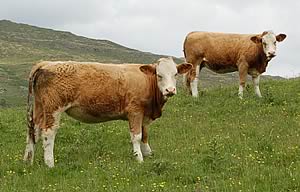 |
|||||||||
|
|||||||||||||||||||
| Double
Standards for Home Produced and Imported Beef 13/07/06 All imported beef must meet the same high production standards as the UK Product - and if it does not consumers should be able to identify non-British beef easily so they know exactly what they are buying.
So says the National Beef Association which is appalled at the indifference displayed at many levels over the integrity of the beef labelling system, the mixing of beef from different countries in supermarket chill cabinets and failure to acknowledge that other country's farm assurance standards fall well below our own. "Britain is at last waking up to the enormous gaps in production standards in Brazil where regular accusations over labour, environmental, hormone implant and disease control abuses are still unanswered. "explained NBA chief executive, Robert Forster. "This could, quite rightly, result in the European Commission's veterinary inspectors (FVO) imposing a ban on all Brazilian beef entering the EU after they have completed a crucial inspection tour this autumn." "But despite growing concern about the Brazilian product many supermarkets are still ignoring an EU directive which forbids the mixing, or co-mingling, of beef from different countries of origin it in the same section of their chill cabinets." "And this is not only making it harder for the domestic industry to raise the profile of its vastly superior product but is also confusing customers who can buy imported beef by mistake." Nor is the NBA happy with the beef labelling system which is designed to help consumers pick out what they are looking for but is not working as well as it should because of weaknesses in the inspection system. "One of the problems is that government inspectors, the producer's police force, are only allowed to visit packing plants once a year - and then they have to warn the operators of their time of arrival," said Mr Forster. "Even so over the last 14 months the inspectors have identified 70 centres, out of 528 inspected, with no traceability system in place, there were 39 occasions in which there were no labels on incoming beef and 48 with no labels on outgoing product." "This is an entirely unsatisfactory situation but if inspections were unannounced and could be conducted on a risk basis the industry could be more certain that imported beef is not being passed off as home produced and regular accusations that more beef is labelled British then is produced in Britain could be more accurately answered." And the NBA would like retail buyers and consumers to be more aware about the differences between UK and Republic of Ireland farm assurance standards too. "British supermarkets insist that all the home produced beef they use comes from ABM assured cattle but some are not as fussy when they accept Irish beef." said Mr Forster. "Last year 230,000 tonnes of beef, the equivalent of 40 per cent of the Republic of Ireland's production was imported into the UK but much less than 40 per cent of Irish cattle are produced on farm assured holdings." "The managers of Ireland's Beef Quality Assurance Scheme have targeted 14,000 farms but so far have only swept up 5,000 and on top of that Irish farms can be certificated with a 60 percent inspection score compared with 100 per cent for ABM in the UK." "In current circumstances a significant proportion of Republic of Ireland beef imported into Britain cannot possibly be farm assured which is one more indication that even though there are higher standards for our own beef the system does not allow the domestic industry to take advantage of the." Mr Forster added.
|
|||||||||||||||||||

|
|
||||||||||||||||||
| home | agri-services | pedigree
pen | news | dairy | beef | machinery property | organisations | site map |
|||||||||||||||||||

